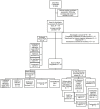Beyond the Walls: An Evaluation of a Pre-Release Planning (PReP) Programme for Sentenced Mentally Disordered Offenders
- PMID: 30450059
- PMCID: PMC6224649
- DOI: 10.3389/fpsyt.2018.00549
Beyond the Walls: An Evaluation of a Pre-Release Planning (PReP) Programme for Sentenced Mentally Disordered Offenders
Abstract
Background: Prison mental health services have tended to focus on improving the quality of care provided to mentally disordered offenders at the initial point of contact with the prison system and within the prison environment itself. When these individuals reach the end of their sentence and return to the community, there is an increased risk of morbidity, mortality, homelessness and re-imprisonment. New models of care have been developed to minimize these risks. Objectives: The objective of this project was to establish a Pre-Release Planning (PReP) Programme with social work expertise, to enhance interagency collaboration and improve continuity of care for mentally disordered offenders upon their release. We aimed to evaluate the first 2 years of the programme by measuring its success at improving the level of mental health support and the security and quality of accommodation achieved by participants upon release in comparison to that reported at time of imprisonment. Additionally, we aimed to explore the impact of these outcomes on rates of re-imprisonment. Methods: A process of participatory action research was used to develop and evaluate the first 2 years of the programme. This was a naturalistic prospective observational whole cohort study. Results: The PReP Programme supported 43 mentally disordered offenders, representing 13.7%, (43/313) of all new assessments by the prison's inreach mental health service during the 2 years study period. When compared with that reported at time of reception at the prison, gains were achieved in level of mental health support (FET p < 0.001) and security and quality of accommodation (FET p < 0.001) upon release. Of those participants seen by the PReP Programme, 20 (46.5%, 20/43) were returned to prison during the 2-years study period. There was no significant relationship between re-imprisonment and gains made in mental health support (FET p = 0.23) or accommodation (FET p = 0.23). Conclusions: We have shown that compared to that reported at time of reception at prison, the level of mental health support and the security of tenure and quality of accommodation both improved upon release following the intervention of the programme. Improved mental health support and accommodation were not associated with lower rates of re-imprisonment.
Keywords: continuity of care; homeless; mental health; participatory action research; prison; transition.
Figures


References
-
- Maden T. Psychiatric morbidity among prisoners in england and wales: Brit. J. Psychiatry (2000) 176:503–503. 10.1192/bjp.176.5.503 - DOI
-
- Durcan G. From the Inside: Experiences of Prison Mental Health Care. Sainsbury Centre for Mental Health; (2008).
LinkOut - more resources
Full Text Sources
Miscellaneous

